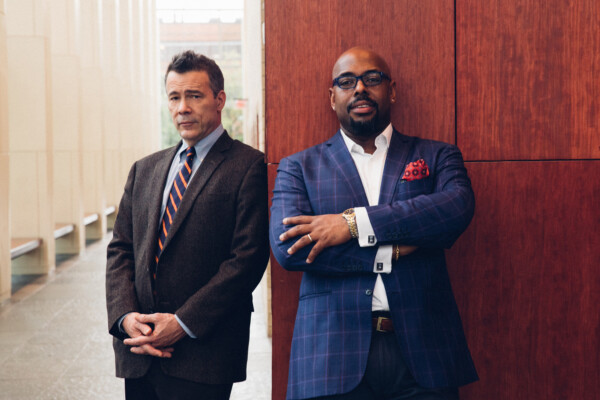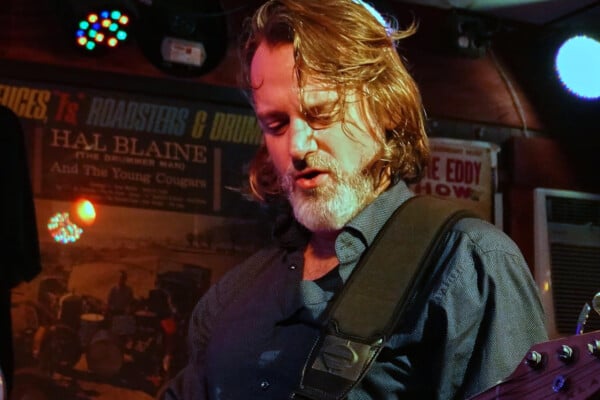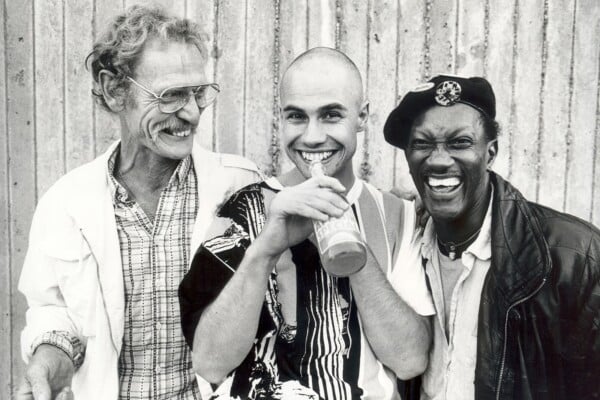Pawn and Prophecy: An Interview with Mike LePond
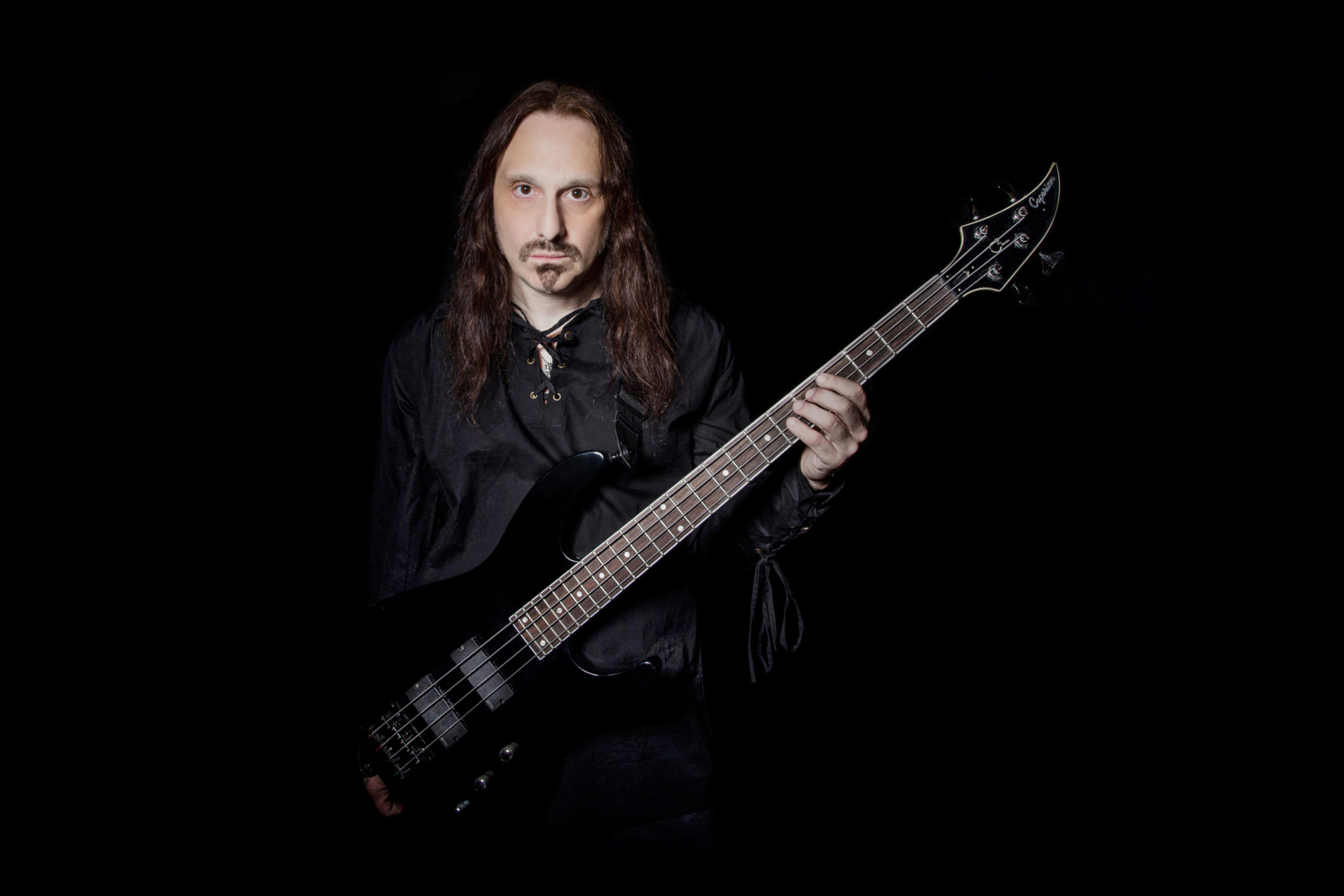
Symphony X bassist Mike LePond is gearing up to release his second album with his solo project, Silent Assassins, and it’s a beast of an album. Pawn and Prophecy is an eight-song adventure leading listeners through the bassist’s favorite literature. Songs vary in story from Greek mythology to literature like H.P. Lovecraft. The masterpiece of the album is a 20-minute epic retelling of Shakespeare’s Macbeth that has as many twists as the play.
Pawn and Prophecy is available for pre-order now and will be released on January 26, 2018. We caught up with LePond to talk about the album, how he writes, how he makes his bass solos, and how he tackled the 20-minute title track.
I really dig this album. Is every song based on literature?
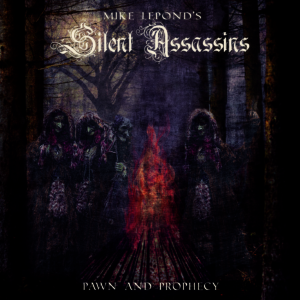 Yeah. When I write lyrics I have to have some sort of story or a concept. So usually all my lyrics are about either history mythology or literature. I just think that those kind of epic stories go great with heavy metal music. So yeah, usually I have a concept for any kind of lyrics that I write.
Yeah. When I write lyrics I have to have some sort of story or a concept. So usually all my lyrics are about either history mythology or literature. I just think that those kind of epic stories go great with heavy metal music. So yeah, usually I have a concept for any kind of lyrics that I write.
I was picking up on that because the one tune that you released,”Avengers of Eden,” is based on an H.P. Lovecraft story.
Actually, on the record there are two songs that are based on Lovecraft stories. I think the original story was called “The Doom That Came To Sarnath,” and then they’re going to actually be releasing a second single in a few weeks. And that’s actually another Lovecraft story called “The Festival”. So yeah I like Lovecraft a lot and of course, I’d like Edgar Allen Poe. They have really cool stories and it’s great to write music to it.
Speaking of epic stories I mean the music is epic. Some of it’s just so so dense and huge sounding. Are you just a big fan of like epic everything?
[laughs] Yeah. You know like sometimes I might have lyrics that I’ve written before any music. I’d be looking at the lyrics and I kind of approach it like, “What if this was for a TV show or a Hollywood movie?” You know, how would I approach the music? I try to make the music as epic as the lyrics are. We do a lot of that in my in my other band Symphony X, so I guess I carry that with me when I do my solo stuff. But yeah, I try to make the music really go in different places and really be have a strong character.
That’s another good point because there’s a pretty good variety of styles on this album. Sometimes I’m hearing kind of like a Judas Priest kind of thing or Iron Maiden. They are big, epic old school metal. Are bands like that big influences for you”
Oh yeah. Those bands were gigantic influences on me. When I was first listening to metal in high school, I had long hair and I loved Judas Priest and Black Sabbath and those bands, so that influence is the basis for my writing style. And then you know I listened to a lot of other stuff. In Europe, there are so many great metal bands that we, unfortunately, don’t get to hear about too much over here in the U.S., but [there’s] a lot of great symphonic metal bands that influence my writing style a lot. Another big influence on my writing style was actually Celtic kind of music style, like Celtic folk. I listened to a lot of Blackmore’s Night so you know all those influences together. You know I’d like some of the different types of heavy metal and rock and I think each song kind of has its own feel and that’s what I was actually going for as well.
What made you go on your own to do this solo project. You started a few years ago, but did you just want to kind of bring all of these styles together?
Well, what made me want to do a solo project is that my main band is Symphony X and that is a progressive metal band and the music is very technical. It’s a lot of really hard stuff to play – very intellectual. I love doing it but as I said before I grew up with all these classic metal bands and I had so many ideas for songs that I knew would not fit in the style. So that was one of the values that got me thinking about you know doing the solo project and so around 2013 or so I started writing songs while I was on tour with Symphony X. I started working on songs for a solo album and then it just started to snowball and the songs just came together really, really well. I think it’s for fans of mine and fans of Symphony X. I think it’s a cool window to see where I came from musically as far as my influences. It’s a great outlet. With Symphony X I get to go up there and do the real hard-to-play kind of stuff and with my solo stuff, it’s just more simplistic and straight ahead. You know, headbanger kind of stuff.
How do you think Silent Assassins has grown in the last four years since you put out the other album?
When the first album was released, unfortunately, it didn’t get out there as much as I was hoping that it would. I mean I was really proud of the album. It was it was a pleasure to do. I loved doing it and I promoted it as best I could but you know unfortunately it was just me and I didn’t really have a band around me to help me do all the promotion, but I did the best I could. I wish I could have gotten it out there more. What it got almost a hundred percent across the board were great reviews. Media really liked it and even the Symphony X fans who, I mean their taste is a little bit different, but they all liked it, too. So overall I was it was a great experience and I was really happy and I loved it enough to do a second record. Now this time around I have the great pleasure of being signed by Frontiers Music as well so I know they’re really going to promote it really really well. And I’ll finally get my hands on that really excited for next year.
It seems like you’ve got a lot more guests this time around, as well. How did you go about picking them?
I learned from the first album. I was trying to think I was like, “Wow, I know all these musicians from all over the world.” And in the beginning, I started talking to different players and singers from all over the world, but when I thought of the reality of that, I was like, “Wow, you know I’m not comfortable with just sending the music to someone and just having them send it back. I really want to be in the studio with them.”
I live in New Jersey, USA and there are just some phenomenally talented people here. Everybody in the rock scene over here we all know each other. So basically I just called up a bunch of my friends who I’ve known for years who I thought would be perfect for the project. I just brought them on board and so it was kind of like just getting together with friends and that made the experience all that much better.
Did you feel like he could get more out of the musicians that way?
I think that they all think highly of me that they really wanted to really do their best for me and that I really appreciated. The singer Allan Tecchio, I’ve known him for many years and we’ve been friends for many years and I always wanted to do something with him. This was the perfect opportunity. We have such a great friendship and it wasn’t like it was a business relationship because we’re such great friends and across the board. That is how my friends were approaching playing on my record, so I think that’s what really put it over the top.
Let’s talk about the title track. It’s 20 minutes and has a huge scope. First of all, it’s based on Macbeth. What made you decide to get into that and how did you approach telling the story through it?
Well, when I joined Symphony X they had a few songs that were really long like that. So I was like wow that’s pretty cool you know. Pretty cool idea. So I had this thought to do Macbeth probably for about ten years. And originally I wanted to give it to Symphony X but it just never got used. It was just laying around. So when this second solo album came around I decided I’m finally going to do it. When you approach a 20-minute song, the key is you don’t want your listener to get bored to death. You have to somehow find a way to keep their interest.
What I did for any part was I tried to make the music fit the part and I tried to have all different kind of feels and styles within the song. And the other challenges are that you want each part to flow into the next part so it doesn’t sound like just a bunch of songs thrown together. You want it to sound like one piece where everything flows into the other part. So that was the challenge and so that’s what I did. I had metal parts, I had classical parts, I had blues parts… I mean everything. And I actually I even added some female singers and to make it as interesting as I could. The story of Macbeth the poem to me is Shakespeare’s like darkest play, and I thought that would be really cool for a long heavy metal kind of epic song. So I tried to make the music move in all different places and then finally at the end have this big crescendo. I tried to have a theme that you would hear throughout from time to time to try to tie the song all together. So it was a really daunting task. And would I ever do another 20-minute song? I don’t know if I have the patience but I’m glad I did this one.
The flow is really nice because I was listening and all the sudden realized it turned into a shuffle blues.
That was another thing I wanted to do because sometimes heavy metal is just so serious. Everybody’s just so serious, so I was like, “You know what? I’m just going to all the sudden in the middle of the song throw a curveball out and just see what happens when people just hear a blues part.
My favorite track on the album was “I Am The Bull”. It’s not just because of the bass, which is incredible, but there’s just something so awesome about it. I love that kind of downtrodden almost Viking-like feeling. Was that an eight or twelve-string bass you had on there?
Exactly. I have this eight-string bass, so I had this one riff that I was playing on the four-string but I said, “You know what? Let me try it on the eight-string.” And on the eight-string, it was cool because it was just sounded so much fuller and the notes were just ringing out that weren’t supposed to be ringing and it was kind of really cool sounding. So I said, “OK, I’m going to do the song on the eight-string, but I’ll solo on the four-string.” I didn’t want to have it all muddy with four-string and the eight-string playing the same thing. So I tried to keep the first thing in the string doing different things and maybe one a little lower one a little higher. The song has got that real slow, plodding Black Sabbath kind of feel to it.
The lyrics were about from Greek mythology the Minotaur and since I wrote the lyrics about that kind of a thing I wanted to give it a real kind of classical almost feel to it. I had some strings in there during the verse and then at the very end you know I brought in the brass section and I thought that made a nice a nice way to end it you know. So it was real dark classical kind of thing and it was cool. When I was soloing I figured maybe the first part I’ll just play just some kind of dark fast kind of playing in the second part maybe I’ll just kind of make a little more mellow and then maybe the third solo just kind of make it a little maybe a little different sounding. That was a fun song to do. That’s probably one of my favorite songs on the record too and I love the focus on it. It’s really really powerful. Sometimes when you write a song you don’t know can’t really tell how it’s going to come out in the end you know but it really came out cool.
The solos on that are are great too. Do you have an approach to writing a solo? Especially on a song that you’ve written yourself, do you envision the sound of it or do you just kind of toy around and see what comes out?
Yeah, usually I’ll listen to what the music is under it so I can get an idea of maybe what scale I might be using. That’s the basis of where I start and then and then I just start playing and then when I hear something that sounds cool I was like, “Oh, OK let me keep that little run.” Then I get a few cool runs and I try to connect them somehow and then put together a solo that way.
I just don’t go into the studio blind, you know. I make sure I write the solo out especially for something like that. I think it’s got to have the right kind of melody. So yeah, I just kind of messed around with it until enough things sounded good that I just kept them all. Pretty simple.
I enjoyed the tone you got, which for the most part is a big, thick sound but also has that snarl that sticks out. What was your key to getting that tone?
So when I went into the studio to record the only thing I did was I just went direct into the board. Just direct. And then during the mix, we tried a few different things. We put one track like through a SansAmp, one direct and then also the engineer had an Ampeg, like a dirty Ampeg plugin. And that sounded pretty good too. So, in the end, the sound is the direct sound mixed with an Ampeg plugin and it gave me that clacking kind of dirty sound but with enough clarity. You know that’s always been important to have the clarity.
Especially in heavy music.
Yeah, and you know and also you know unfortunately on a lot of metal records you just can’t hear the bass. The guitar player might have this really low ended sound and you’re trying to compete with guitars low end and the bass drum and so I made sure to tell the engineer that to make the guitar sound in midrange high so you know the bass could fit in that low end there.
It drives me crazy. I hardly hear any of the bass on these metal records so I made sure the bass was a little more up in the mix and it was able to cut through.
What advice do you have for up and coming bass players?
Don’t try to learn the hard stuff first, you know? Learn your basics.Learn blues first. Learn your scales and all the basic stuff and just listen to how the bass has evolved for the last 40 or 50 years. Learn all the different styles and work your way up to the hard stuff. If you if you learn the hard stuff first you’re going to have a lot of problems because most stuff is easy.

